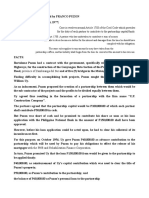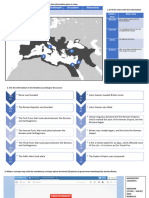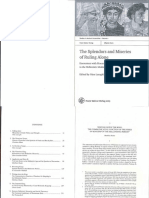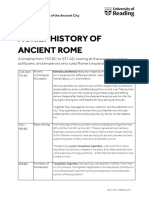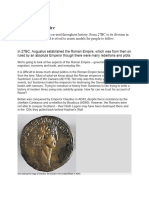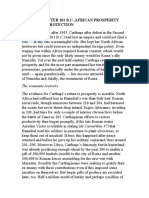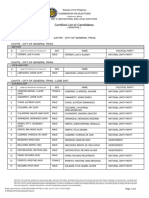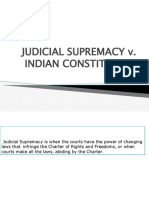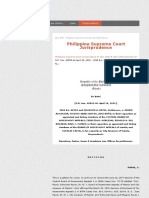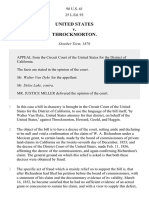Republic of Rome Timeline
Republic of Rome Timeline
Uploaded by
Farhat IshaCopyright:
Available Formats
Republic of Rome Timeline
Republic of Rome Timeline
Uploaded by
Farhat IshaOriginal Title
Copyright
Available Formats
Share this document
Did you find this document useful?
Is this content inappropriate?
Copyright:
Available Formats
Republic of Rome Timeline
Republic of Rome Timeline
Uploaded by
Farhat IshaCopyright:
Available Formats
THE REPUBLIC OF ROME
507: Brutus and L. Tarquinius Collatinus (who is rapid-
Tarquinius Superbus, last King of Rome
Wars in Italy
Wars in the West
Wars in the East
ly displaced) lead a popular revolt – or more likely a
palace coup – to overthrow king Tarquinius Superbus,
establishing the Republic.
506: Brutus and Poplicola elected first consuls.
Publius Publius Lucius
Horatius Valerius Junius
Cocles Poplicola Brutus
Monarchy
Almost 200 years of intermittent warfare with their central
Intermittent Wars 2nd Servile War Manius Aquillius suppresses Sicilian slave revolt.
and Raids against Italian neighbours—the Aequi, Hernici and Volsci—and their
Civil Wars Defends the
Sublician
bridge Gaius
Neighbours northern neighbours, the Etruscans. 493: B. Lake Regillus.
The last king, Tarquinius, supported by the Latins and Etrus-
1st Cilician Pirates
500 BC
Mob violence cans, is finally def. in his attempts to retake the throne. 455: Social War Marius and Sulla defeat Italian uprising.
against the Marcius
Republic
Etruscan B. Mons Algidus. Cincinnatus defeat Aequi. 443: B. Corbio.
491: Latin League formed.
king Lars Coriolanus T. Quinctius Capitolinus Barbatus defeats Aequi and Volsci. 1st Mithridatic 85: B. Orchomenus. Sulla defeats Mithridates VI of Pontus.
Persian Wars
Proscriptions, state violence War Mithridates' invasion of Greece stopped.
491: Start of the conflict of the orders. First secession of the Porsenna.
Mythic
plebs, who withdraw to the Mons Sacer. They create two offices to War of Fidenae/ Etruscans ejected from the Roman side of the Tiber. 20 year
Dictator Thwarted in his 2nd War of Veii truce. 2nd Mithridatic Local clash.
Struggle of the Orders: Stage 1
defend their rights against the patricians: two tribunes of the
plebs and two pleb aediles to assist them. Spurius ambitions, Coriolanus War
Consul leads the Volsci 3rd War of Veii 393: M. Furius Camillus defeats, sacks, and enslaves
483: Sedition of the former consul Spurius Cassius Vicellinus, Cassius against Rome, but is Rome's greatest enemy to date, Veii, wealthiest city in Sullan Civil Wars 82: B. Colline Gate. Sulla defeats Republicans under L.
Tribune, tribunician power who proposes agrarian reforms. Vicellinus defeated by the Etruria, after a long siege. Start of the Roman slave-based Cornelius Cinna.
virtue of Roman
economy.
Intermittent wars and raids against neighbours in central Italy
women. Sertorian War Pompey defeats the last Marians, led by Quintus Sertorius, in
Censor 468: Lex Publilia. Until this time the tribunes had been elected by the Comitia Curi-
1st Celtic Invasion 387: B. the Allia. Gauls sack Rome. Many records lost. Spain. Marian resistance destroyed. Sertorius murdered by his
ata, an assembly completely dominated by patricians. Plebs succeed in creating a Lucius Gauls paid off by Camillus. subordinate, prefiguring the later fates of emperors.
second and more democratic body, the Comitia Tributa, to elect the tribunes and
pass plebiscites (non-binding resolutions). Number of tribunes increased to five. Quinctius
This work by Garry Stevens is Republics (Princeton, 2010); G.
Cincinnatus 2nd Celtic Invasion Camillus defeats Gauls. 3rd Mithridatic 72: B. Cabira/Sivas, L. L. Lucullus defeats Mithridates VI. 69: B.
licensed under Creative Commons Forsythe, A Critical History of Early Titus War Tigranocerta, Lucullus defeats Tigranes of Armenia. 66: B. the
Rome (University of California 448-7: The Decemviri, a board of ten commissioners with absolute power,
licence CC-BY-NC-ND, and is
Press, 2005) and The History of Quinctius 1st Samnite War 339: B. Mount Gaurus. M. Valerius Maximus Corvus defeats Lycus, Pompey defeats Mithridates VI. Pompey sweeps through
available for free from led by the arrogant Appius Claudius Crassus, are appointed to codify and
www.garryscharts.com. See terms Rome podcasts
(thehistoryofrome.typepad.com). publish the laws. They attempt to cling on to power, ruling through oppres- Capitolinus Samnites. Stalemated when Latins revolt. the East, on the back of Lucullus' victories. Rome's most
of use there. Version 1.8.
The timelines for individuals are sion, but are eventually expelled. The result of their work is the Twelve Ta- Barbatus tenacious opponent since Hannibal destroyed.
Main source: Brian Taylor's series
of books (Spellmount, 2008), not lifespans, but career lengths;
bles, which would remain the foundation of Roman law for centuries. Latin War 336: B. Vesuvius. P. Decius Mus I sacrifices himself. 335: B.
usually starting from their first War of Crassus and Pompey defeat Spartacus. Last of the great slave
Trifanum. T. Manlius Torquatus defeats Latins.
Wars of Survival
which correct the traditional
position in the cursus honorum.
Varronian dating in many cases
prior to 300 BC. Other sources Maps show the largest cities at 446: Leges Valeriae Horatiae. Tribunes declared sacrosanct, plebiscites give Appius Spartacus/3rd revolts.
include H. Fowler, Roman each time.
the force of law. 442: Lex Canuleia legalises patrician-plebeian intermarriage, Claudius 2nd Samnite War 319: B. Caudine Forks. Samnites defeat Romans. 308: 1st Servile War
formerly prohibited by the Twelve Tables. 440: Office of censor created. Crassus B. Lake Vadimo: Q. Fabius Rullianus defeats Etruscans. 304:
War of Fidenae/ 2nd War of B. Bovianum. L. Papirius Cursor defeat Samnites. First use Gallic Wars Gaius Julius Caesar defeats Gauls. In one of history's great
437-6: Sedition of Spurius Maelius, who buys Etruscan grain to of Roman naval forces (in Adriatic). genocides, Caesar kills perhaps one-third of the population, and
Veii Archetype of
distribute to the populace. Thwarted by elderly Cincinnatus.
Military Tribunes alternate with Consuls
Roman enslaves one million.
leadership, civic 3rd Samnite War Grand coalition of Etruscans, Umbrians, Samnites and
virtue and Italian Gauls. 295: B. Sentinum. Rullianus & P. Decius Mus II Caesar's Civil War 48: B. Pharsalus. Caesar defeats Republicans under Pompey.
Peloponnesian War
442-367: Boards of military tribunes with consular powers often elect-
ed instead of two consuls as the chief magistrates. The office is ob-
modesty, but a defeat coalition. 293: B. Aquilonia. M. Curius Dentatus 46: B. Thapsus. Caesar def. Republicans under Metellus Scipio.
bitter opponent of defeats Samnites. Samnites admitted as allies. In acts of magnanimity unusual for a Roman victor, Caesar
Republic of the Patricians
scure. It lacked the religious authority granted to consuls, and seems the plebs.
to have been devised to deny the plebs the consulship proper. consistently forgives his enemies (with some notable exceptions)
Marcus Gallic and Etruscan 283: 2nd B. Lake Vadimo. P. Cornelius Dolabella defeat the
Revolt Italian Gauls and Etruscans in their last stand War of Sextus 36: B. Naulochus. Agrippa defeats the last Republican, Sextus
Furius Pompeius Pompeius, son of Pompey, who had threatened Rome's grain
Camillus Pyrrhic War 275: B. Beneventum. Dentatus defeats Pyrrhus of Epirus. supply from Sicily.
The Roman legion demonstrates it can hold its own against
the Greek phalanx. Italy secure from Hellenistic threats. Civil War of Antony 43: B. Forum Gallorum. Octavian sides with the Republicans to
3rd War of Veii
defeat Antony. 400
Armies maintained in the field for more than one season, and paid. Conquest of Rapid conquest of southern Italy after Pyrrhus leaves. At the
Etruria's largest city razed to the Southern Italy end, Rome controls all of Italy. War of the 42: B. Philippi. Octavian & Antony def. the Liberatores (M. Junius
ground. Sack of Veii marks start of the decline of the Etruscans. Liberators Brutus and G. Cassius Longinus). Largest battle fought between
1st Punic War 242-241: B. Aegates Islands. G. Lutatius Catullus defeats Romans (36 legions), save possibly the B. Lugdunum (197 AD).
1st Celtic Invasion Carthage. First overseas military engagements.
Gauls sack Rome. Last violation Perusine War Octavian defeats L. Antonius, brother of Antony.
382: Sedition of Marcus Manlius Capitolinus – saviour of the Capitol during the Gallic siege –
of Rome for 850 years. 1st Illyrian War Punitive expedition against pirates.
who argues for plebeian debt relief. Assasinated.
War of Actium 31: B. Actium. Octavian & Agrippa defeat Antony and Cleopatra.
Camillus, after a lifetime of military achievement against the Etruscans and Celts, is hailed as 3rd Celtic Invasion 222: B. Clastidium. M. Claudius Marcellus defeats Gauls. Octavian now sole master of the Roman world.
Republic
the second founder of Rome. He straddles the transition from a mythic Rome to historical fact.
2nd Illyrian War Punitive expedition. Cantabrian War Augustus completes conquest of northern Spain.
371-367: Obscure period of near-anarchy led by pleb agitation.
2nd Punic War 202: B. Zama. P. Scipio Africanus def. Hannibal. Rome's only
363: Leges Licinae Sextia (traditionally held to be supported by Camillus). Gaius rival in the West vanquished after an epic life-or-death German Wars T. Claudius Nero and his brother N. Claudius Drusus, sons of
2nd Celtic Invasion Permanent restoration of the consulate. One consul to be a pleb, but only Augustus' wife Livia, defeat Germans. Borders of empire in
Marcius struggle. Syracuse, the last great Greek city-state, captured.
observed intermittently in the next 20 years. Praetorship created to assist Europe mostly stabilised, although Rome will soon move from
the consuls and curule aediles. 362: Lucius Sextus Lateranus is elected the Rutilus 1st Macedonian Philip V of Macedon defeats Greek alliance. Rome plays little the Elbe to the Rhine as a border.
Early
first pleb consul, although records indicate pleb consuls decades before. War part.
352: Gaius Marcius Rutilus elected the first pleb Titus 2nd Macedonian 197: B. Cynoscephalae. T. Quinctius Flaminius defeats Philip
dictator, then in 347 the first pleb censor. Republic of the Patricians soldiers who man Rome's armies.
Manlius War V. 196: Liberation of Greece from Macedonian threat. Greek
phalanx decisively defeated by Roman legions. Philip loses Dominated by the patricians, a group of The nobiles are not only incapable of
342: Hereafter, at least one consul is always a pleb. 335: Leges Torquatus understanding the economic changes
all non-Macedonian territory. Greek cities in Asia Minor families traditionally held to be the de-
Struggle of the Orders: Stage 2
1st Samnite War transforming Rome, but also of governing
Publiliae. At least one censor must be a pleb. Plebs have now placed under Roman protection. scendants of the senators chosen by the
Alexander the Great
Campania made a dependency. achieved permanent access to the highest magistracies. the burgeoning empire created after the
first king, Romulus. Eligibility for office is
War of Antiochus/ 190: B. Magnesia. Cnaeus Domitius & P. Scipio Africanus strictly hereditary with this class. 2nd Punic War. The constitution that
Latin War Latins crushed & Latin League 330: Rome's most intractable central Italian foes, the Volsci, ex-
Lucius Syrian War defeat Antiochus III of the Seleucid kingdom. evolved to govern the city of Rome is
dissolved. Campania annexed. pelled from the Liris valley. They disappear from history. The plebeians (the vast majority of the inadequate to administer provinces many
Rome controls all its neighbour- Papirius 1st Celtiberian War T. Sempronius Gracchus defeat Celtiberians in Spain. First of population) wage a slow-burning cam- weeks or months distant from Rome; the
ing states. Corvus is renowned for holding six consulships, a Cursor paign over centuries, the Struggle of the
a long series of revolts in Spain. governors sent to these provinces suc-
record not exceeded until Marius. Marcus Orders, to open up the high offices of cumb to venality and corruption; and the
Romans adopt the maniple military system from the Samnites. Valerius 3rd Macedonian 168: B. Pydna. L. Aemilius Paulus def. Perseus of Macedon. state. So opposed are the patricians at legions that depended on Roman citizen-
Maximus War Macedon subdivided. Greece and Anatolia made every turn, that the plebs are forced to farmers are obliged to draw on Italian
312: Appius Claudius Caecus builds the road Via Appia to Capua
protectorates. Antiochus IV of the Seleucid kingdom create their own parallel legislative as- manpower instead.
2nd Samnite War Corvus
Conquest of Italy
in Campania for military purposes, and the aqueduct Aqua Appia.
acknowledges Roman suzerainty over eastern sembly (the Comitia Tributa) and officers
Rome is now much more socially and technologically sophisticat- Populares politicians repeatedly attempt
Mediterranean. Huge numbers of slaves taken from Epirus. (the tribunes and plebeian aediles). Even-
ed than its neighbours. to address the long-running issues of the
tually the patricians are forced to con-
Etruria made a dependency. 3rd Illyrian War 168: L. Anicius Gallus defeats Genthius. Illyria subdivided. cede even their most precious privileges, status of the non-Roman Italians, the use
303: The Aequi, last of Rome's age-old central Italian enemies, of the public land, and the status of the
the religious offices of state.
are finally destroyed. Roman landless.
300: Lex Ogulnia. After defending their monopoly on the religious
Lusitanian War Q. Caecilius Metellus Macedonicus supp. revolt in Spain.
Republic of the Nobiles
Fall of the Republic
300
4th Macedonian Q. Caecilius Metellus Macedonicus supp. revolt of Andriscus. With offices open to both classes, the
3rd Samnite War offices of state for centuries, the patricians open the pontifices ruling families are reconstructed as the An enduring pattern that would last until
War & Achaean L. Mummius sacks Corinth. Macedon made a province.
Samnites admitted as allies. and augurs to the plebs. descendants of dictators and consuls of the end of the empire in 476 AD is estab-
Appius War Corinth destroyed, Greece subjugated: end of Greek political
287: Lex Hortensia. The plebiscites of the Comitia Tributa, previ- history. Vast numbers of slaves taken from Greece. both patricians and plebs: the nobiles. lished: warlords (Marius, Sulla, Pompey,
Gallic & Etruscan Revolt ously only held to be binding on the plebs, are given the force of Quintus Manius Claudius The eminence of families now derives Caesar, Augustus) commanding armies
law. The Struggle of the Orders ends, and the Republic of the Fabius Curius Caecas from repeated election to high office, owing loyalty to themselves, and not any
Rome controls all northern and central Italy. 3rd Punic War 146: S. Aemilianus sacks Carthage, razing it to the ground.
Nobiles begins. sense of a polity, take control of the state
Maximus Dentatus rather than mere heredity. Further, per-
by militarily destroying their rivals.
Pyrrhic War Rullianus Marcus Numantine/ S. Aemilianus finally defeats Celtiberians in Spain. Marked sonal achievement comes to be defined
Appius Claudius is the first Roman whose political biography and
agenda we know in detail. Atilius Celtiberian Wars decline in Roman military competence. by success in war, the pinnacle of which Monarchy
Regulus is the award of a triumph. The patrician-plebeian distinction is now
Conquest of Southern Italy 1st Servile War P. Rupilius suppresses Sicilian slave revolt.
Roman Revolution only of religious and antiquarian signifi-
Rome controls all of Italy. Cimbrian War 105. B. Arausio. Teutones and Cimbri def. Romans. Possibly Rome's conquests in Greece and Asia cance. The last Republican standing war-
the greatest battle casualties in Roman history (80,000). Minor bring a massive influx of wealth lord, Augustus, creates a monarchy, co-
255: After his defeat and capture by the Carthaginians at the B. of Panormus, M. 102-101: B. Aquae Sextae, B. Vercellae. They are destroyed and slaves, transforming the ancient opting the ancient Republican nobiles.
Atilius Regulus is paroled to Rome, where he argues against peace. He honours his by Marius. Italy made safe from invasion for over 200 years. citizen-farmer economy to one dominated These families' influence will only end
1st Punic War parole, returning to Carthage, where he meets his death. Hailed as the model of by ruthless nobile exploitation of the very with the fall of Augustus' dynasty in 68.
Roman integrity. Jugurthine War Q. Caecilius Metellus Numidicus replaced by Marius and his
Republic
subordinate L. Cornelius Sulla, who defeat the Numidians.
Although suffering crippling losses in men, material, and money in the 1st Punic war, the Romans refuse to accept
Domination of the Mediterranean
Quintus
anything other than total victory. Where other nations would surrender after a massive defeat, the Romans would raise
MIddle
Gaius Fla- Fabius
another army and return for the next campaign season. However, the war produces no great generals or statesmen. minius Maximus
Earliest Latin literature: Lucius Livius Andronicus, a Greek freedman,
1st Illyrian War translates the Odyssey into Latin, and writes the first Latin plays.
Marcus Nepos Verrucosus
Claudius Gaius
Marcellus Lutatius
Republic of the Nobiles
227: First steps towards an imperial administration, as Sicily, Sardinia and Corsica
3rd Celtic Invasion are established as the first non-Italian provinces, governed by praetors. Catulus
First native Roman dramatist: Gnaeus Naevius, comic playwright.
2nd Illyrian War Unlike the 1st Punic war, Rome fields many excellent generals for the 2nd Punic War, such as Q. Fabius Maximus Verrucosus,
G. Flaminius Nepos, M. Claudius Marcellus, and P. Cornelius Scipio. Although shorter than the first struggle against Carthage,
the 2nd war is mainly fought in Rome's own backyard, and against one of the great captains of history, Hannibal. Publius
1st Macedonian War
First Roman historian: Q. Fabius Pictor, who wrote in Greek. Cornelius
2nd Punic War Scipio
The 2nd Punic War ravages the independent citizen-farmers who had manned the Roman armies for years on end. As they
fall into debt, their lands are confiscated by their creditors, and they swell the numbers of the urban poor in Rome.
2nd Macedonian War P. Scipio Africanus is the first general to acquire a personal following and be hailed as Imperator (‘victorious gen-
200
eral’, which became our 'Emperor'), an epithet that would haunt the late Republic and provide a template for the Tiberius
entire history of the Empire as the loyalty of the soldiers transfers from the state to individual leaders. Sempronius Lucius
War of Antiochus Gracchus Aemilius
Africanus and Flamininus extend the traditional Italian patron-client system to the peoples of conquered Paullus
175 BC Greek cities. They are philhellenes, championing new philosophies, creeds, and practices.
180:Lex Villia Annalis codifies the cursus honorum, establishing set periods between the holding of offices.
Macedonicus
Publius
1st Celtiberian War Cornelius
Terms used in the late republic to denote those senatorial advocates either defending the age-old M. Porcius Cato the Censor is the archetype of Roman integrity and incorruptibility, a symbol to later generations of
Optimates privileges of the nobiles (the Optimates) or those championing the vast populace (the Populares). Scipio Marcus
Hellenistic kingdoms effectively neutralised. everything that was good and great about Rome: a farmer, soldier, statesman, and zealous defender of ancient Ro-
The distinction lies deeply rooted in the ancient Struggle of the Orders, and can be traced back to man values against decadent innovations. But he is also merciless to his enemies, inhuman to his slaves, and spite- Titus Africanus Porcius
3rd Macedonian War Populares the supposed sedition of the consul Spurius Cassius Vicellinus (483 BC). Over 400 years, ending ful to his political opponents. Author of the first history of Rome to be written in Latin rather than Greek. Quinctius Cato
3rd Illyrian War with Gaius Julius Caesar, the nobiles assassinated politicians advocating land reform, debt relief, Flamininus
Lusitanian War and Italian rights; each time claiming that the Populares intended to restore the despised rule of
Others kings (which was quite likely true only in Caesar's case). S. Sulpicius Galba, a general and governor in Spain, comes to symbolise the venality, incom-
petence and treachery of Roman generalship and administration in the Spanish wars.
4th Macedonian & Achaean Wars Scipio
S. Aemilianus — general, statesman, orator, intellectual, philhellene— is a moderate in radical times, and the last Servius
Aemilianus
3rd Punic War great Roman not involved in the fall of the Republic. His death is one of the minor mysteries of Roman history. Sulpicius
Growing civil disorder, exacerbated by impoverished veterans of the Spanish wars returning to Rome.
Tiberius Galba
Growth of the latifundia, large estates run by slaves, created by buying up the lands of the citizen farmers Gracchus
133: Tribune T. Gracchus introduces legislation redistributing public lands to the plebs, including the Gaius
Numantine Wars lands of King Attalus III of Pergamum, who had bequeathed his kingdom to Rome. In a radical move, Sempronius
he takes his proposal direct to the Comitia Tributa, bypassing the traditional (but informal) prerogatives
of the Senate. Enraged by this threat to their customary powers, the nobiles, led by the Pontifex
Gracchus
Pergamene Bequest b Maximus Scipio Nasica, lead a mob to assassinate him. Nonetheless, his legislation is passed, and his
Republic
brother G. Gracchus works on the Land Commission to implement his reforms.
Quintus Quintus
Roman Revolution
1st Servile (Slave) War 123-122: Tribune G. Gracchus promotes land, judicial and military reforms. He introduces tax-
farming, subsidies for grain, and payments for military clothing. Assasinated by the Optimates. Caecilius Caecilius
Cimbrian War
Metellus Metellus
107-104: Marius reforms the military, recruiting from the landless poor for the first time. This creates a profession- Macedonicus
Jugurthine War al army owing loyalty to its general, not the state. In his first consulship, he persuades the Comitia Tributa to over-
Numidicus Lucius
rule the Senate and assign him the command assigned to Numidicus; a tactic to be used by later generals. Cornelius
Lucius
2nd Servile War 104-100: Marius is elected consul for an unprecedented five consecutive terms, violating the Lex Vatinia, winning Sulla
Appuleius
military glory by defeating the Germans in what was to be the last invasion of Italy for over 200 years.
Late
War of the Cilician Pirates Saturninus
102-100: Mob violence of Saturninus, eventually controlled by his former ally Marius, Marcus
who falls from grace. Electoral process hereafter corrupted by bribery and violence. Aemilius 100
Cyrenaican Bequest 91: In an attempt to forestall further Populares action, and to preserve the Scaurus
Gaius
Wars of Empire
Social War Optimates' dominance, tribune M. Livius Drusus introduces numerous
Marius
1st Mithraditic War
75 BC reforms, including extension of citizenship to the Italians. Misunderstood by all
Optimate.
Eminent
classes, he is assassinated. In reaction, the Italians revolt in the Social War. Lucius Marcus
Sullan Civil Wars 88: Incited by Marius and intimidated by the militia of Sulpicius, the Comitia Tributa strips the elected consul,
L. Cornelius Sulla, of his command for the Mithraditic War. In an unprecedented move, Sulla marches his army 87-82: Marian Terror: Marius returns to Italy while Sulla is in the east, effectively Licinius Livius Publius Marcus
2nd Mithraditic War Lucius Lucullus Drusus Sulpicius
into Rome and spends a year consolidating the Optimates' position. Marius flees. overthrowing the Senate. Mass proscriptions as a deranged or senile Marius (in Tullius
pursuit of a prophesised 7th consulship) and his co-consul Cinna annihilate the Cornelius Rufus
Sertorian War Optimates. Cinna eventually stops the violence by murdering Marius' slave followers. Gaius Cicero
Fall
82-79: Returning to Italy from the Mithraditic War, Sulla again marches on Rome and defeats the Marians. Cinna
Following Marius' example, he conducts bloody proscriptions of the Populares. Sulla becomes Dictator, an Julius
War of Spartacus
office unused since the Punic Wars, to revise the constitution in favour of the Optimates. 70: Pompey and Crassus overturn Sulla's reforms. Senate enfeebled by years of proscriptions. Caesar
Gnaeus Publius
3rd Mithraditic War Marcus
66-63: Pompey completes conquest of the east, brilliantly reorganising the provinces and clients. Pompeius Clodius
Licinius
60: Pompey, Crassus and Caesar reach an informal arrangement, the 1st triumvi- Magnus Rome's Crassus Pulcher
rate, to manipulate the state for their ends. Effective end of Republican politics. 58-52: Mob violence of Clodius. greatest
Pompey appointed sole consul. orator, who 1st
Gallic Wars 49-46: Caesar marches on Rome. The Republicans, under Pompey and Cato, flee. attempted to Triumvirate
Caesar progressively defeats all the Republican armies arrayed against him. Marcus preserve the
Caesar's Civil War Porcius
46-44: Caesar is consul, dictator, censor and tribune simultaneously, destroying the constitu- republic, but
43: Last independent consuls, Pansa
Antony's Civil War tion. He institutes a Populares program, but is assassinated by the Liberatores in 44. Cato was outfoxed and Hirtius, die in the Civil War of Antony.
by Caesar,
43-42: Octavian (Caesar's heir), Antony (Caesar's chief lieutenant) and Lepidus (a grandee Sextus then by Octa-
War of the Liberators taken on board to placate the conservatives) take formal control of the state in the 2nd vian.
War of Sextus Pompeius Triumvirate. They defeat the Liberatores at the B. of Philippi. Mass proscriptions of the Pompeius 2nd
Republicans, most notably Cicero. Senatorial class further debilitated. Marcus Triumvirate
Perusine War Antonius
31: Octavian and Agrippa defeat Antony and establish a military dictatorship.
War of Actium
27: 1st constitutional settlement of Octavian. Perpetual consul, proconsular imperium over many provinces,
and hence command of most legions (20, compared to the Senate's 5). Awarded titles of Augustus Nero
Cantabrian War (Illustrious) and Princeps (First Citizen). Transition from ruthless Octavian to benign Augustus. Claudius Tiberius
23: 2nd constitutional settlement. Maintaining the veneer of the Republican constitution, Augustus de- Marcus Drusus Claudius
clines the perpetual consulship but acquires imperium over all proconsuls and the consuls in Rome, and 22: Last elec-
MonarchY
Aemilius Nero Gaius tions for the
therefore becomes head of all the legions. Granted the tribunician and censorial powers for life. He also
manoeuvres to make this unique position hereditary in his family (initially to his nephew M. Claudius Mar-
Lepidus Julius ancient office
Danube Wars
cellus), a concept alien to Rome since the kings, but familiar from the Hellenistic monarchies. Marcus Caesar of censor.
19: L. Cornelius Balbus is the last general outside the imperial family to be awarded a triumph. Vipsanius Augustus
Agrippa
12: Upon the death of Lepidus, Augustus becomes Pontifex Maximus. All the offices and functions of
1 BC state – civil, judicial, military, and religious – are now unified in one person for the first time since the
kings, in an office that will later be known as the emperor of Rome.
1 BC
You might also like
- Themes in Roman Society and CultureDocument5 pagesThemes in Roman Society and CultureIlman Ahmad0% (1)
- Bleckmann Roman War Finances in The Age of The Punic WarsDocument9 pagesBleckmann Roman War Finances in The Age of The Punic WarsMiddle Republican HistorianNo ratings yet
- Grile Present Simple & ContinuousDocument5 pagesGrile Present Simple & Continuouskis10No ratings yet
- Uy Vs Puzon DigestDocument4 pagesUy Vs Puzon DigestClaudine Sumalinog100% (1)
- The Emperors of RomeDocument1 pageThe Emperors of RomeneosirusNo ratings yet
- Battle of The Teutoburg ForestDocument16 pagesBattle of The Teutoburg ForestAnonymous 3Y1ZnENo ratings yet
- Battle of Lake Regillus - WikipediaDocument3 pagesBattle of Lake Regillus - WikipediaSeba PerezNo ratings yet
- NRCE Study Guide NOV (v1 - 0)Document27 pagesNRCE Study Guide NOV (v1 - 0)warren.kong123No ratings yet
- VespasianDocument10 pagesVespasianEye GodfreyNo ratings yet
- War Between Sextus Pompey and The Second Triumvirate - WikipediaDocument4 pagesWar Between Sextus Pompey and The Second Triumvirate - WikipediadopointtNo ratings yet
- Roman RepublicDocument27 pagesRoman Republicekindedeoglu4913No ratings yet
- Rome WorksheetDocument5 pagesRome Worksheetkboom73reloadNo ratings yet
- CaracallaDocument20 pagesCaracallaEye GodfreyNo ratings yet
- Instant Ebooks Textbook Daily Life of The Ancient Romans David Matz Download All ChaptersDocument84 pagesInstant Ebooks Textbook Daily Life of The Ancient Romans David Matz Download All Chaptersbolcicchilp83100% (2)
- Pax Romana - WikipediaDocument5 pagesPax Romana - WikipediaBrayan Anderson Chumpen CarranzaNo ratings yet
- History T2 Summary - Year 12Document34 pagesHistory T2 Summary - Year 12sophchen333No ratings yet
- Lucius Tarquinius SuperbusDocument7 pagesLucius Tarquinius SuperbusGost hunterNo ratings yet
- The Communicative Function PDFDocument23 pagesThe Communicative Function PDFSafaa SaiedNo ratings yet
- Barbarian Warrior Vs Roman Legionary Marcomannic Wars AD 165-180Document81 pagesBarbarian Warrior Vs Roman Legionary Marcomannic Wars AD 165-180ibn al xuffasch100% (1)
- Roman RepublicDocument44 pagesRoman RepublicPaul SavvyNo ratings yet
- Razboaiele GaliceDocument1 pageRazboaiele Galicepolitista100% (1)
- Emperors of RomeDocument21 pagesEmperors of Romeapi-94838463No ratings yet
- MHL-Gadagne ThemedSheet GalloromanLyonDocument2 pagesMHL-Gadagne ThemedSheet GalloromanLyonRodrigo Sánchez LópezNo ratings yet
- Crisis of the Roman RepublicDocument13 pagesCrisis of the Roman Republicalexandra deanNo ratings yet
- Marcomannic WarsDocument12 pagesMarcomannic WarsNicolas PerraultNo ratings yet
- Illinoisclassica 91984 BOWENDocument12 pagesIllinoisclassica 91984 BOWENМаша КрахмалёваNo ratings yet
- Aulus Vitellius (/VDocument6 pagesAulus Vitellius (/VEye GodfreyNo ratings yet
- List of Revolutions and RebellionsDocument48 pagesList of Revolutions and RebellionsKoti RaoNo ratings yet
- A Brief History of ItalyDocument18 pagesA Brief History of ItalyLazni NalogNo ratings yet
- The Rise of Imperial Rome AD 14-193 PDFDocument95 pagesThe Rise of Imperial Rome AD 14-193 PDFGeorge George100% (4)
- Rome 2Document2 pagesRome 2EINSTEINNo ratings yet
- History of The Roman RepublicDocument493 pagesHistory of The Roman RepublicⰒⰅ ⰕⰡ ⰅⰂⰔ ⰕⰀ ⰕⰋⰅѵⰀ100% (1)
- Imagining Power Reality Gaps in The RomaDocument23 pagesImagining Power Reality Gaps in The RomaChristopher DixonNo ratings yet
- Overthrow of The Roman MonarchyDocument6 pagesOverthrow of The Roman MonarchyGost hunterNo ratings yet
- History of RomeDocument418 pagesHistory of RomeMorick Gibson Mwasaga100% (1)
- Ancient Rome - WikipediaDocument25 pagesAncient Rome - Wikipediavedprakashabhay500No ratings yet
- Roman EmperorsDocument10 pagesRoman EmperorsAbdurrahman Shaleh Reliubun100% (1)
- WH 1Document1 pageWH 1api-348134015No ratings yet
- Intro To RomeDocument9 pagesIntro To Romedill43No ratings yet
- 2.1.-Roman-ArtDocument9 pages2.1.-Roman-Artnalimatar222No ratings yet
- Roman Britain, 43 - 410 AD: The Fall of The Roman RepublicDocument3 pagesRoman Britain, 43 - 410 AD: The Fall of The Roman RepublicAgus RodriguezNo ratings yet
- Women and History in RomeDocument16 pagesWomen and History in RomeIlijan RaškovićNo ratings yet
- Daily Life of The Ancient Romans (David Matz) (Z-Library)Document264 pagesDaily Life of The Ancient Romans (David Matz) (Z-Library)introvertscholar24No ratings yet
- GRST 209 Rome ReviewDocument9 pagesGRST 209 Rome ReviewIlman AhmadNo ratings yet
- Greatest Nations 03 ElliDocument408 pagesGreatest Nations 03 ElliShouBunKunNo ratings yet
- CAMPBELL EvocatiDocument4 pagesCAMPBELL EvocatiRoberto López CasadoNo ratings yet
- Roman Art.Document21 pagesRoman Art.Candela UnreinNo ratings yet
- 1333340893Document1 page1333340893Debdeep BhuniaNo ratings yet
- UntitledDocument427 pagesUntitledDionysius TNo ratings yet
- Roman Empire 1Document9 pagesRoman Empire 1Renzie MacariolaNo ratings yet
- Ancient Rome Was ADocument16 pagesAncient Rome Was AAngela PageNo ratings yet
- Palatine HillDocument3 pagesPalatine Hillnatia saginashviliNo ratings yet
- Triptych of The Roman EmpireDocument2 pagesTriptych of The Roman EmpireScribdTranslationsNo ratings yet
- Publius Helvius Pertinax (Document6 pagesPublius Helvius Pertinax (Eye GodfreyNo ratings yet
- A Brief History of Ancient RomeDocument9 pagesA Brief History of Ancient Romeengpierre1403No ratings yet
- 09.04.rise Fall Roman Empire OUTLINE PDFDocument8 pages09.04.rise Fall Roman Empire OUTLINE PDFBetsy D. SantiagoNo ratings yet
- RomeDocument72 pagesRomeSacrifice_scummNo ratings yet
- KS3 History Year 8and 9Document126 pagesKS3 History Year 8and 9tatianaamani11No ratings yet
- Carthage After 201 BCDocument11 pagesCarthage After 201 BCMilanko KosticNo ratings yet
- Immediate download Empire Hegemony Or Anarchy Rome and Italy 201 31 BCE First Edition Karl-Joachim Hölkeskamp ebooks 2024Document50 pagesImmediate download Empire Hegemony Or Anarchy Rome and Italy 201 31 BCE First Edition Karl-Joachim Hölkeskamp ebooks 2024bearnecayol100% (3)
- Process Selection and FacilityDocument17 pagesProcess Selection and FacilityFarhat IshaNo ratings yet
- Forecasting: Chapter Three Operations Management William J. StevensonDocument20 pagesForecasting: Chapter Three Operations Management William J. StevensonFarhat IshaNo ratings yet
- Stipend Form (Farhat Binta Pasha)Document1 pageStipend Form (Farhat Binta Pasha)Farhat IshaNo ratings yet
- CH 5 MKT 2021Document81 pagesCH 5 MKT 2021Farhat IshaNo ratings yet
- Slobodan Jankovic Israeli Borders Amid GDocument162 pagesSlobodan Jankovic Israeli Borders Amid GSlobodan JankovićNo ratings yet
- Deed of Sale With Assumption of MortgageDocument1 pageDeed of Sale With Assumption of MortgageJJ Gapol100% (1)
- Torts Case DigestsDocument10 pagesTorts Case Digestskemsue1224No ratings yet
- Black Letter Law Grid - Constitutional Law Study Guide - Quick Reference Law School GuideDocument2 pagesBlack Letter Law Grid - Constitutional Law Study Guide - Quick Reference Law School GuideJJ850100% (5)
- Kings of War Compendium Changelog 1.16Document11 pagesKings of War Compendium Changelog 1.16Emilie Rotger DelageNo ratings yet
- Marikina Auto Line Transport Corp. v. PeopleDocument11 pagesMarikina Auto Line Transport Corp. v. PeopleAlexandra Nicole SugayNo ratings yet
- Restrictive and Permissive View On Use of ForceDocument9 pagesRestrictive and Permissive View On Use of ForceShadow MoonNo ratings yet
- Friday Submission CasesDocument4 pagesFriday Submission CasesCarl Marx FernandezNo ratings yet
- JurisprudenceDocument34 pagesJurisprudenceAnonymous qFWInco8cNo ratings yet
- Evaluation:: Youth Ministry Meeting MinutesDocument3 pagesEvaluation:: Youth Ministry Meeting MinutesAj BarbaNo ratings yet
- Emma Mærsk: Worlds Largest Container CarrierDocument14 pagesEmma Mærsk: Worlds Largest Container CarrierOleksiyNo ratings yet
- Canra BankDocument13 pagesCanra BankplacementamigosjsrNo ratings yet
- "Freely We Serve/ Because We Freely Love": The Politics of Love in John Milton's Paradise LostDocument22 pages"Freely We Serve/ Because We Freely Love": The Politics of Love in John Milton's Paradise LostLiana Kirstin WillisNo ratings yet
- Signal and BlinkersDocument54 pagesSignal and Blinkersparvesh kunduNo ratings yet
- Certified List of Candidates: Cavite - City of General Trias Cavite - City of General TriasDocument2 pagesCertified List of Candidates: Cavite - City of General Trias Cavite - City of General TriasRealyn Bregoli ConstantinoNo ratings yet
- Wargames Illustrated #127Document64 pagesWargames Illustrated #127Анатолий Золотухин100% (1)
- Child Justice ActDocument69 pagesChild Justice Actbellydanceafrica9540No ratings yet
- Judicial Supremacy V. Indian ConstitutionDocument15 pagesJudicial Supremacy V. Indian ConstitutionAnubhav ShuklaNo ratings yet
- Interior Design ContractDocument4 pagesInterior Design ContractRocketLawyer100% (4)
- Electric Shocks and Protection: Additional Learning MaterialDocument3 pagesElectric Shocks and Protection: Additional Learning Materialold flameNo ratings yet
- Central Bank of Nigeria DecreeDocument5 pagesCentral Bank of Nigeria Decreesimonpaul2No ratings yet
- United States District Court District of Arizona: Complaint For Declaratory and Injunctive ReliefDocument55 pagesUnited States District Court District of Arizona: Complaint For Declaratory and Injunctive ReliefJessicaNo ratings yet
- The Canterville Ghost Key To Activities PDFDocument4 pagesThe Canterville Ghost Key To Activities PDFsebas50% (2)
- O Kanenas EnglishDocument9 pagesO Kanenas EnglishKostas Sarmas100% (3)
- Fdocuments - in - Database List of Politicians President VP Mps PDFDocument49 pagesFdocuments - in - Database List of Politicians President VP Mps PDFMaharshi MadhuNo ratings yet
- 1 RGDGNDocument13 pages1 RGDGNRuth TenajerosNo ratings yet
- ORIEL MAGNO v. CA, GR No. 96132, 1992-06-26Document2 pagesORIEL MAGNO v. CA, GR No. 96132, 1992-06-26Rhodz Coyoca EmbalsadoNo ratings yet
- United States v. Throckmorton, 98 U.S. 61 (1878)Document9 pagesUnited States v. Throckmorton, 98 U.S. 61 (1878)Scribd Government Docs100% (1)



